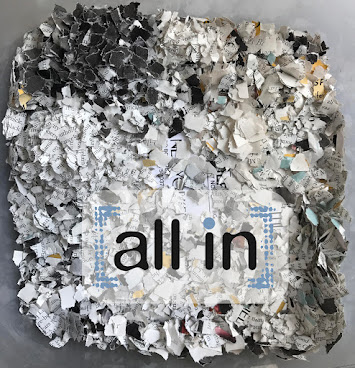All In
Inclusion means meeting people at the point where they are, not where we want them to be or where it would most benefit us. Inclusion is looking past the disability and seeing human value in ways we may not have even considered. A parent once shared with me following a 2nd-grade school field trip that she overheard another parent ask her son what was wrong with my son. Her son responded “what do you mean, there’s nothing wrong with H”. Seeing disability before ability wasn’t new to me. When I was around the same age, a child of recently divorced parents asked a small group on the playground if they had a father living at home. I said yes. Next to me, a friend who had been to my house and knew my father had quadriplegia from an unforgiving form of MS, quickly added “she has a different kind of Dad” to which I responded, “no I don’t.”. Of course, I knew our life was different than most living at a time when the world was mostly inaccessible to those with physical disabilities. I knew kids were aware I stayed behind during the big school trip, didn’t have family vacations and a dental appointment for my Dad required an ambulance ride. But that was not what was asked. She asked if I had a father at home. I had a father who loved us. Knowing some kids didn’t have a father at home, I counted this blessing. These interactions inspired me years later to create a photo exhibit titled LoweLight: See More of Me, encouraging people to see past a disability and notice a spirit, a personality, an individual.
Social media can enhance inclusion or create a larger divide. When my oldest son became an adult, he began to connect to his friends as many of us do, through social media. I feared that some of the videos his friends who live with special needs were sharing online would be used for cruel intent. I cringe thinking about the possibility of others sharing these videos and inviting others to mock or criticize with condescending comments. Most users of social media have seen this where others share a post with an invitation to comment or “describe in one word” only to be followed with demeaning and cruel remarks. This is someone’s child, friend, neighbor and this may be someone with a disability. This isn’t new to social media. There are those who joke at the expense of others, labeling those not laughing as being too sensitive or not having a sense of humor but won’t tolerate jokes at their own expense or those aimed at their political party because that’s just not funny. Social media seems to accentuate this ability to mock others through a digital veil. People put others down to feel better about themselves or their situation. Kindness toward others can do the same. Give it a try.
This doesn’t mean inclusion is void of humor. Inclusion brings humor not by laughing at each other but by a laugh shared together. I remember a parent I met through youth sports, listening to a story about big H, then, after a quick hesitation, joining me for a laugh. Afterward, she said, "I decided if she laughs, then I will". It’s OK to laugh at the interesting twists and turns of life. Laughter can be healing when it is aimed at a situation and not an individual.
Inclusion is kind and welcoming, collaborative and supportive, aware and considerate, energetic and joyous. I can’t speak for every person who has special needs but I know what my son offers. He has an infectious laugh, a great sense of humor, and he beams when he sees you letting you know that spending time with you is on the top of his list. He is hilarious and if you don’t believe this he will tell you that himself. He makes you rethink the world you thought you knew. Really both of my boys do that. What child hasn’t? They make us thankful for the good things in life like spending time with our favorite people, celebrating with our favorite food, slowing life down to enjoy what is around us, and celebrating our accomplishments with gusto and excitement. People with special needs gravitate to the best people on this Earth - those with kind hearts. People who are just insanely great to be around because they make you feel better just by spending time with them. Inclusive communities involve seeing someone for the good they bring and not the barriers they face. It includes asking someone how they are doing, listening to their response with interest, and having patience if they need a minute to respond. We all benefit from slowing down our crazy lives. An inclusive society works best when we are all in.




Comments
Post a Comment